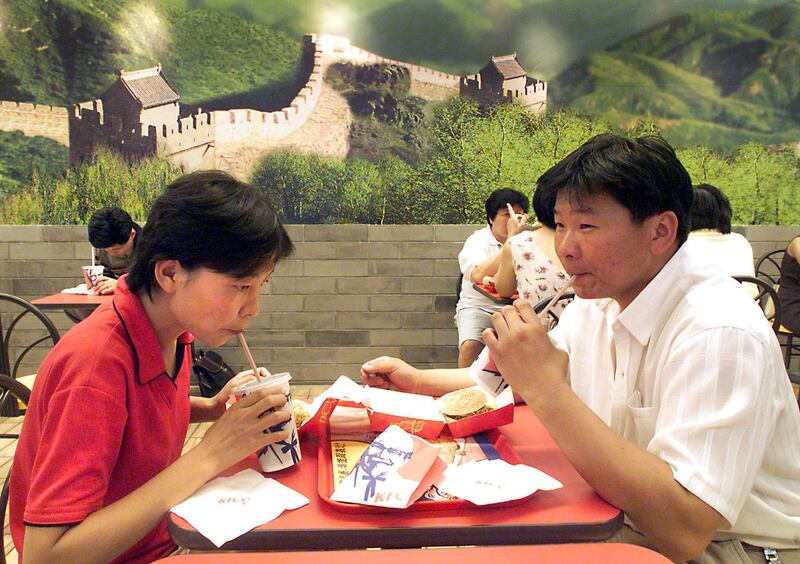Beijing authorities are moving to ban the display of commercial advertising from buses on routes that pass through the iconic center of Communist Party rule – Beijing's Tiananmen Square – not far from where crowds once flocked to first taste Kentucky Fried Chicken under the economic reforms of late supreme leader Deng Xiaoping.
The municipal government is planning to ban advertising on the sides of buses and trolley-buses passing through the square, which is home to communist monuments like the Great Hall of the People and the mausoleum of late supreme leader Mao Zedong as well as the front gate of the Forbidden City museum, from which Mao’s portrait looks down at passing traffic.
"We have friends all over the world!" proclaims one of the red and gold slogans next to Mao. "Long live the People's Republic of China!" shouts the other.
Just along Qianmen Street from the southwestern corner of the square lies a multistorey branch of Kentucky Fried Chicken – an icon of the economic reform era ushered in by Mao's successor Deng Xiaoping that saw people freed up to make money as fast as they liked, and the start of a burgeoning private sector.
But political commentators say the ruling Chinese Communist Party under Xi Jinping is once more turning against symbols of private commercial gain, in favor of "socialism with Chinese characteristics in the new era."
A Beijing-based journalist who gave only the surname Ma for fear of reprisals said this is the main reason for the new ban on advertisements.
"The leadership ... basically rejects the private sector and commercial activities," Ma said. "I think it's in line with their thinking ... that buses passing through Tiananmen Square won't be allowed to carry advertisements."
‘Forbidden Zone’
Draft revisions to regulations governing bus and trolley-bus advertising reported in the Beijing Daily on Monday detail a "forbidden zone" in Tiananmen Square, outside the Forbidden City where China's emperors once ruled, and Zhongnanhai where the current government has its headquarters.
Any buses on routes passing down Chang'an Boulevard between Wangfujing shopping district to the east and Xidan to the west will be banned from displaying any advertising, the paper reported.

"Vehicle body advertisements should be rectified in a timely manner," state broadcaster CCTV reported on the same day.
"It's to create a uniform look, so that when you see TV footage or watch the news, all of the shots and images that you see will have been carefully controlled by the Communist Party," social activist Lu Jun told Radio Free Asia on Tuesday.
Like Pyongyang
He drew a parallel with the banning of commercial advertising from buses in North Korea.
"[This will create] a clean look of extreme purity, with no whiff of commercialism anywhere," he said. "The thinking is all about political correctness."
Tiananmen Square, where Mao proclaimed the People's Liberation Army to cheering crowds on Oct. 1, 1949, has been the venue for multiple mass protests over the past century, one of which ended in the June 4, 1989, massacre of civilians by the People's Liberation Army.
Security was also tightened after a number of people pursuing grievances against the government attempted self-immolation and other forms of more recent protest.
A Beijing resident who lives near Tiananmen Square and who gave only the surname Zhang for fear of reprisals said security has gotten stricter and stricter in the area in recent years.
"There aren't that many routes that go along Chang'an Boulevard – just the No. 1 and the No. 5," he said. "So it's pretty minimal."
He said passengers on the subway system have to get out on side-streets, instead of taking the stairs up to Chang’an Boulevard, and need to show ID to enter Tiananmen Square.
But for Zhang, it's scarcely a return to a pristine, socialist past.
"When I was a kid, you could wander in and out of Tiananmen Square at will," he said. "Now you have to book in advance."
Translated by Luisetta Mudie. Edited by Malcolm Foster.
